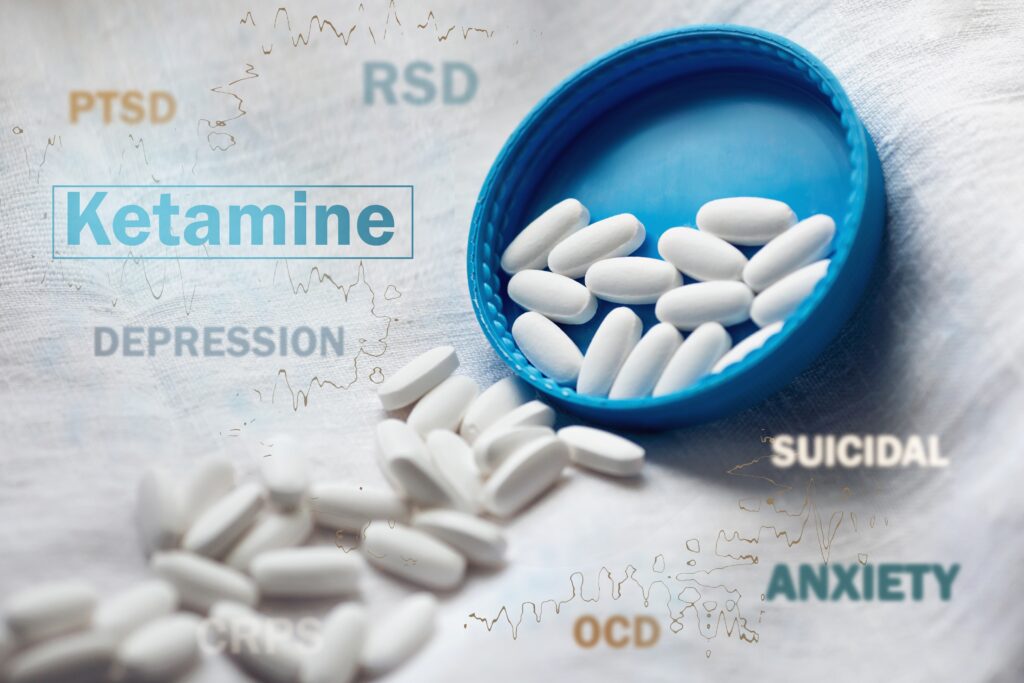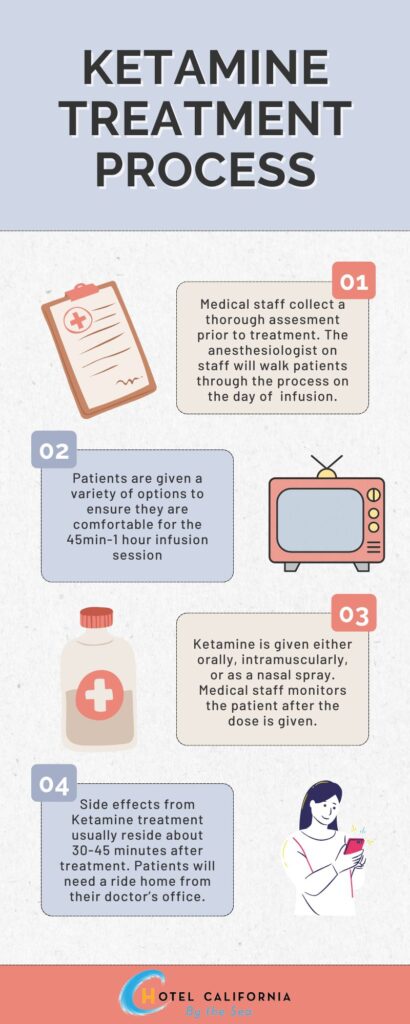Does Ketamine Therapy get you High?
Ketamine therapy and the use of ketamine to help treat various mental health disorders has been on the rise over the past decade. The controversy over the unconventional treatment was brought to the spotlight after the death of American actor Matthew Perry. Perry was found with a significant amount of ketamine in his system equivalent to what doctors would use during general anesthesia and not the typical dose given during medical therapy sessions. The amount of ketamine found in his body is what likely caused him to lose consciousness, which led to his ultimate death.

According to the medical examiner’s investigation into his death, it showed that Perry had been using ketamine in an unsupervised setting to cope with his conditions of depression and decades of substance addiction struggles. So what is ketamine therapy and how effective is it as a treatment for severe mental health conditions? Does ketamine therapy get you high? Does it produce the same effects as recreational use of the drug?
History of Ketamine
Ketamine is a drug that dates back to the 1960s and was first used as a powerful anesthetic. It then gained popularity as a recreational hallucinogenic substance. However, over the past decade, the drug has begun gaining traction in the medical field for those seeking relief from treatment-resistant depression and other mental health disorders such as post-traumatic stress disorder (PTSD), obsessive-compulsive disorder (OCD), bipolar depression, anxiety and eating disorders.
Ketamine is a controlled substance and is highly regulated by the DEA with strict controls on the drug due to its potential for abuse and addiction. Ketamine works by turning off areas of the brain that are involved in disappointment. Studies have found that these areas of the brain are probably already involved in depression and other mental health conditions and therefore ketamine can be effective in relieving the symptoms.

How does Ketamine Therapy work?
Today, research and many new studies have shown that ketamine has the potential to safely treat those suffering from serious mental health illnesses. Studies show ketamine can work as a fast-acting antidepressant compared to traditional medications that can take weeks or months to take into effect. It is generally a safe treatment option. However, there is still a lack of long-term data showing the prolonged effects of this type of treatment.
Ketamine therapy is not the first option for treating depression. It is generally only considered when all other traditional antidepressant treatments and clinical options have not been proven effective. In 2006, researchers at the National Institute of Health showed that an intravenous dose of ketamine could relieve symptoms of severe depression in a matter of hours. This is in comparison to other treatment methods like medication management of Prozac and Zoloft, which can take up to weeks to ease the condition. In 2019, the FDA approved the medication Spravato, an antidepressant nasal spray application derived from ketamine. It was created for people with treatment-resistant depression and those who suffer from suicidal thinking. Despite the fairly simple application of a nasal spray, the medication does require supervision by a medical provider.
Ketamine therapy is typically given intravenously in carefully calculated small doses. Infusions typically last around 40 minutes or so. Patients are carefully monitored and assessed for vitals, side effects and symptoms during the treatment process. The number of ketamine therapy sessions can vary depending on each person. However, a typical treatment program is around six treatments over a 2-3 week time period in addition to behavioral therapies. Studies have shown that ketamine therapy has helped significantly reduce severe symptoms of depression in about 50-70% of patients who participate in the medication treatment. Some patients have even reported having several months of symptom relief.
One of the benefits of ketamine therapy is its ability to act and work quickly. However, due to the quick onset, the drug also tends to wear off just as quickly and isn’t as long-lasting as traditional medications.
Ketamine therapy isn’t for everyone. It is typically avoided in people with a history of psychosis, people with a history of substance use disorder, teens and young adults as well as older adults who might have symptoms of dementia.
Does Ketamine Therapy get you high?
Ketamine therapy administers a low dose of the drug that can elicit a dissociation effect producing a “high.” Most patients who undergo ketamine therapy have reported experiencing a “high” sensation of sensory changes and hallucinations. Patients can typically expect to experience dissociative and psychedelic symptoms during therapy treatment.
- Sense of detachment from oneself and surroundings
- Alterations in perception of time
- The sensation of floating outside of one’s own body, pleasantly leaving your physical self behind
- Feelings of intense euphoria
- Experiencing intense visuals
- Alcohol-like intoxication
When the ketamine high experience becomes intense it is often described as a “k hole” in which patients are able to feel safe and supported enough to explore their alternate levels of consciousness. Oftentimes, they emerge from the “k hole” with a better understanding of self and a calmer state of mind. Some patients have even reported a sense of clarity and the ability to better process their emotions and cope with their mental health challenges.
Check Your Insurance Coverage for FREE
Find out if your insurance covers addiction treatment in minutes. We accept most insurance!
What is the difference between recreational Ketamine users and Ketamine infusion patients?
- Recreational Ketamine users consume large doses of the drug in order to experience an intense high. They have little regard for the risks. Many of these user seek the “k hole” experience in an attempt to tune out and escape the realities of their life. They are at increased risk for dependence and addiction which can result in extreme paranoia, anxiety and overdose.
- Ketamine infusion therapy patients receive a regular controlled low dose of the drug under medical supervision. This type of drug use is to help treat chronic pain and extreme mental health disorders. Patients are typically not seeking a psychoactive experience but often welcome it as part of healing.
Effects of Ketamine Abuse
Despite the recent popularity of ketamine infusion treatment therapy, ketamine itself can become habit-forming and lead to addiction and a substance use disorder. Some of the major side effects of abuse consist of psychoactive symptoms.
- Euphoria – the intense sensation of pleasure or excitement
- Sensory distortion – alteration in how people perceive their surroundings and environment
- Relaxation – sense of calmness
- Impaired judgment – having difficulty making sound decisions
- Impaired coordination – challenge in body movement and control
- Disrupted perception of reality
- Hallucinations
- Disassociation
- Seizures
- High blood pressure
- Dizziness and headache
- Dangerously slowed breathing
- Anxiety
- Blurred vision
- Nausea and vomiting
Reach out to Hotel California by the Sea
We specialize in treating addiction and other co-occurring disorders, such as PTSD. Our Admissions specialists are available to walk you through the best options for treating your addiction.
Substance Use Disorder Treatment
Many recent studies have suggested ketamine therapy can help treat symptoms of severe depression and other mental health conditions that cannot be treated through traditional clinical practices. The findings have resulted in positive outcomes for many who have found relief for their mental health disorders. However, there is still more ongoing research needed to determine the long-term effects of ketamine infusion therapy. Ketamine can still become an addictive substance when used recreationally and when being abused. Behavioral health treatment programs such as Hotel California by the Sea provide knowledge, support and treatments for those who are struggling with ketamine substance abuse.
We offer treatment at all levels of care including detox, residential, PHP and IOP. We utilize evidence-based treatment methods such as CBT, DBT and group therapy. At Hotel California by the Sea, we have experience in helping those with substance use disorders and co-occurring mental health conditions. We are dedicated to helping our clients through every step of treatment to reach their goals of sobriety and recovery.
References:
https://www.washingtonpost.com/wellness/2022/09/12/ketamine-therapy-explained
https://www.bbc.com/news/articles/ckgw5yky91zo
https://www.npr.org/2023/12/15/1219761972/what-is-ketamine-friends-matthew-perry
https://www.health.harvard.edu/blog/ketamine-for-treatment-resistant-depression-when-and-where-is-it-safe-202208092797
https://www.uchealth.org/today/ketamine-safety-is-it-addictive-does-it-help-with-depression/
